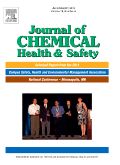
ACS Chemical Health & Safety
Scope & Guideline
Advancing safety in chemical research and industry.
Introduction
Aims and Scopes
- Chemical Safety Education and Training:
The journal emphasizes the importance of educating students and professionals about chemical safety, including innovative training mechanisms and curriculum development. - Risk Assessment and Management:
A core focus is on methodologies for assessing and managing risks associated with chemical handling and laboratory practices, including the use of various analytical frameworks. - Emerging Technologies and Safety:
Research on the implications of new technologies, such as nanotechnology and AI, on safety practices in laboratories and industries is a significant area of interest. - Community Engagement and Safety Culture:
The journal explores the role of community involvement and the development of a safety culture within educational and industrial settings. - Accident Analysis and Lessons Learned:
A recurring theme is analyzing past incidents to extract lessons that can inform future safety protocols and prevent similar occurrences. - Chemical Exposure and Toxicity Studies:
The journal publishes studies on the toxicity of various chemicals and their safe handling, aiming to provide a comprehensive understanding of health risks. - Regulatory Compliance and Best Practices:
Articles often address compliance with safety regulations and the implementation of best practices in chemical management.
Trending and Emerging
- Integration of AI in Safety Practices:
The use of artificial intelligence to enhance safety practices and improve training methodologies is a growing area of interest, highlighting the intersection of technology and safety. - Focus on Mental Health and Safety Culture:
Emerging themes include the mental health aspect of safety culture, recognizing the psychological factors that influence safety compliance and behavior in laboratory settings. - Sustainability and Green Chemistry:
There is an increasing trend toward addressing sustainability in chemical practices, including the safe handling of environmentally friendly materials and waste management. - Community-Based Safety Initiatives:
Research focusing on community engagement in safety practices is gaining traction, emphasizing collaborative approaches to enhance safety culture. - Novel Materials and Safety Concerns:
With the rise of new materials, particularly nanomaterials, there is an increasing emphasis on understanding their safety implications and exposure risks. - Real-Time Monitoring and Risk Assessment Technologies:
Innovative approaches for real-time monitoring of chemical hazards and risks are emerging, reflecting the need for dynamic safety management in laboratories.
Declining or Waning
- Traditional Hazard Communication Methods:
There has been a noticeable decrease in papers focusing exclusively on conventional hazard communication methods, as newer technologies and approaches are gaining traction. - General Laboratory Safety Protocols:
The journal has shifted away from publishing generic laboratory safety protocols to more specific case studies and innovative practices that address current challenges. - Focus on Historical Perspectives:
While historical analyses have been important, there is a waning interest in papers that solely focus on historical safety practices, as the community seeks more forward-looking solutions. - Chemical Management in Non-Academic Settings:
Research related to chemical safety management in non-academic settings, such as industrial environments, seems to be receiving less attention compared to academic laboratory safety. - Single Chemical Studies:
There is a declining emphasis on studies that focus on the safety of single chemicals without considering broader applications or composite risks.
Similar Journals
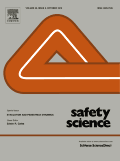
SAFETY SCIENCE
Shaping policies with evidence-based safety research.SAFETY SCIENCE, published by Elsevier in the Netherlands, is a premier international journal dedicated to advancing the fields of safety research, public health, environmental and occupational health, and risk management. With an impressive impact factor and recognized as a Q1 journal in multiple categories for 2023, its rigorous peer-reviewed articles are essential for researchers, professionals, and students alike. The journal covers a wide range of topics designed to influence safety practices and policies globally. Although Open Access options are not available, the substantial insights provided in each issue underscore the journal's critical role in enhancing the understanding of safety and risk dynamics in a constantly evolving world. With a convergence of knowledge from the years 1991 to 2025, SAFETY SCIENCE remains at the forefront of evidence-based research, stimulating essential dialogues and innovations that shape our approach to safety in various domains.
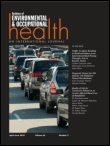
Archives of Environmental & Occupational Health
Exploring the vital connections between work and wellness.Archives of Environmental & Occupational Health is a prestigious journal published by Routledge Journals, Taylor & Francis Ltd, dedicated to advancing research and knowledge in the realms of environmental science, occupational health, and toxicology. With an ISSN of 1933-8244 and an E-ISSN of 2154-4700, this peer-reviewed journal has gained significant recognition, currently holding a Q2 ranking in Environmental Science and Q3 rankings in Health, Toxicology and Mutagenesis, and Public Health. Established in 2005, it serves as a vital platform for researchers, practitioners, and policymakers alike who aim to address and disseminate findings on pressing environmental and occupational health issues. The journal is not open access, allowing for rigorous peer review processes while still reaching a broad readership. As it converges through 2024, the Archives of Environmental & Occupational Health continues to play a critical role in shaping discourse and fostering innovation in the field, making it an essential resource for those committed to improving both human health and the environment.

ARCHIVES OF TOXICOLOGY
Exploring the Complexities of ToxicologyARCHIVES OF TOXICOLOGY is a prestigious journal published by Springer Heidelberg, dedicated to advancing research in the field of toxicology and related disciplines. With a distinguished history dating back to 1930, this journal has continuously provided vital insights and groundbreaking studies, making it a cornerstone in the areas of health, toxicology, and medicine. Recognized for its high impact, it occupies a top-ranking position in Scopus, with remarkable quartile placements in 2023, categorizing it as Q1 in Health, Toxicology and Mutagenesis, and Q1 in Medicine (Miscellaneous). The journal highlights critical research and innovative methodologies, appealing to a diverse audience of researchers, professionals, and students committed to understanding the complexities of toxic substances and their implications for public health and environmental safety. The journal does not currently offer open access, allowing for a more traditional but rigorous peer-review process that ensures the quality and integrity of every published article. Join the global discourse in toxicological science with ARCHIVES OF TOXICOLOGY, where every contribution furthers the understanding of safety and toxicity in our world.
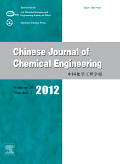
Chinese Journal of Chemical Engineering
Transforming Ideas into Impactful Solutions in Chemical EngineeringChinese Journal of Chemical Engineering, published by CHEMICAL INDUSTRY PRESS CO LTD, is a premier academic journal dedicated to advancing the field of chemical engineering and related disciplines. With a strong emphasis on innovative research and practical applications, the journal spans a wide range of topics including biochemistry, environmental engineering, and general chemistry. Boasting a commendable impact factor and a consistent presence in Q2 quartiles across multiple categories, it ranks impressively in Scopus, notably positioned in the top percentile of its fields, enhancing its credibility and reach among the scientific community. Published continuously since 1993 and converging towards its 2024 goals, the journal remains committed to fostering sustainable and impactful research. Researchers, professionals, and students alike will find invaluable resources and cutting-edge insights, making the Chinese Journal of Chemical Engineering an essential platform for disseminating pivotal work in the realms of chemical and environmental sciences.
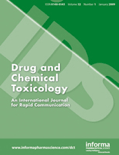
DRUG AND CHEMICAL TOXICOLOGY
Bridging disciplines for safer environments.Drug and Chemical Toxicology is a well-respected journal in the fields of toxicology, pharmacology, and public health, published by Taylor & Francis Ltd. Since its inception in 1978, this journal has diligently explored the effects and mechanisms of chemical exposures on health and the environment, fulfilling a crucial role in advancing scientific understanding and safeguarding public health. The journal is indexed across prestigious databases and features an impressive array of articles categorized within the Q2 and Q3 quartiles across various categories in 2023, reflecting its significance in Chemical Health and Safety as well as Environmental and Occupational Health disciplines. With an extensive reach and a focus on interdisciplinary research, Drug and Chemical Toxicology offers a rich repository of original research, reviews, and methodological advancements, catering to a diverse audience of researchers, professionals, and students dedicated to the betterment of safety and health standards. Although not an open-access publication, its articles are widely accessible to the academic community, ensuring that critical innovations and insights are shared for the greater good.
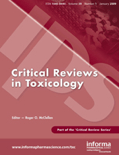
CRITICAL REVIEWS IN TOXICOLOGY
Driving Knowledge Forward in the Realm of ToxicologyCRITICAL REVIEWS IN TOXICOLOGY, published by Taylor & Francis Ltd, stands as a preeminent journal within the field of toxicology, boasting an impressive Q1 ranking and holding the distinction of being ranked 12th out of 133 in the toxicology category according to Scopus, placing it in the top 91st percentile. With a continuous publication history since 1971 and a commitment to providing high-quality reviews, the journal offers critical insight into the latest research and advancements in toxicological sciences. While it is not an open-access journal, it provides numerous access options for both subscribers and institutions, ensuring that its extensive articles are widely available to the academic community. The journal's objectives are to disseminate comprehensive reviews that foster understanding and innovation in the assessment of chemical risks, environmental impacts, and the mechanisms of toxicity, making it an invaluable resource for researchers, professionals, and students dedicated to the science of toxicology.
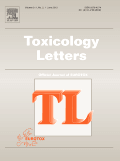
TOXICOLOGY LETTERS
Connecting research and practice for a healthier world.TOXICOLOGY LETTERS is a prominent journal dedicated to advancing the field of toxicology, providing a platform for high-quality research and reviews that explore the effects of chemical substances on biological systems. Published by Elsevier Ireland Ltd, this peer-reviewed journal has established itself as a vital resource in toxicological research since its inception in 1977, with a convergence of studies extending to 2024. With an impressive Scopus ranking, positioned at #28 out of 133 in the Toxicology category, TOXICOLOGY LETTERS garners a respectable percentile of 79, highlighting its significance in the academic community. Although it is not an open-access journal, its research is accessible through institutional subscriptions, ensuring that critical insights into human health and environmental safety are disseminated effectively. Being categorized in the Q2 quartile in both Medicine (miscellaneous) and Toxicology for 2023 further emphasizes its relevance and impact in these fields. This journal aims to foster collaboration between researchers and professionals, encouraging the exploration of innovative solutions to chemical hazards and the promotion of safer practices in pharmacology and toxicology.
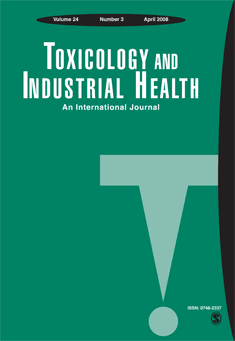
TOXICOLOGY AND INDUSTRIAL HEALTH
Pioneering research at the intersection of health and industry.TOXICOLOGY AND INDUSTRIAL HEALTH, published by SAGE PUBLICATIONS INC, is a premier journal in the field of toxicology, public health, and environmental health, with a significant history dating back to 1985. With its ISSN 0748-2337 and E-ISSN 1477-0393, the journal provides a platform for disseminating groundbreaking research and comprehensive reviews that address the complexities of toxic substances in industrial and occupational settings. Despite its Q3 ranking among peers in health, toxicology, and public health, this journal is becoming increasingly influential, reflected in its growing citation metrics. Researchers and professionals benefit from its commitment to fostering knowledge in both theoretical and practical contexts, making it an essential resource for those dedicated to advancing understanding in this vital field. The journal's main objectives include promoting research addressing the implications of toxicology on health and safety standards across industries, ensuring accessibility to current studies for a global audience. Overall, TOXICOLOGY AND INDUSTRIAL HEALTH plays a critical role in bridging the gap between research and real-world applications, proving invaluable to students, professionals, and researchers alike in their pursuit of enhancing public health and environmental safety.
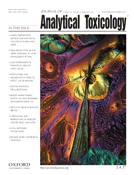
JOURNAL OF ANALYTICAL TOXICOLOGY
Empowering Safety Through Analytical ExcellenceJOURNAL OF ANALYTICAL TOXICOLOGY, published by Oxford University Press Inc, stands as a leading platform in the field of analytical chemistry and toxicology, focusing on the rigorous exploration of methodologies and advancements in the detection of toxic substances. Since its inception in 1977, this journal has continually contributed to the scientific community, providing researchers and professionals with vital insights into chemical health, safety, and environmental implications. With an impressive Q1 ranking in both Analytical Chemistry and Chemical Health and Safety, along with reputable Q2 rankings in Environmental Chemistry and Toxicology, the journal maintains its critical standing in vibrant academic communities, ensuring the dissemination of high-quality research. Although it currently does not offer open access, articles are made available via institutional subscriptions, allowing widespread access to its valuable findings. Located in the United States, the journal contains a wealth of knowledge poised to benefit scientists and scholars engaged in toxicological research, emphasizing its importance in enhancing public health and safety.
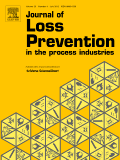
JOURNAL OF LOSS PREVENTION IN THE PROCESS INDUSTRIES
Empowering industries through cutting-edge risk management research.The Journal of Loss Prevention in the Process Industries, published by Elsevier Science Ltd, stands as a vital platform for advancing knowledge and practice in risk management and safety within the fields of chemical engineering, industrial and manufacturing engineering, and beyond. With an H-Index reflecting significant scholarly influence, this journal features a diverse scope, addressing critical issues from process safety and reliability to innovative solutions for energy efficiency. Ranking in the second quartile (Q2) across several categories, including Control and Systems Engineering and Safety, Risk, Reliability and Quality, it highlights the interdisciplinary nature of loss prevention strategies. Researchers and professionals can access this journal through subscription, ensuring they stay at the forefront of developments from 1988 to 2024. As a hub of cutting-edge research, the journal not only aims to disseminate high-quality studies but also fosters a community dedicated to enhancing safety and operational excellence in process industries worldwide.